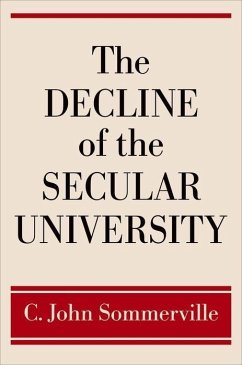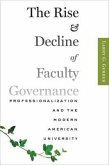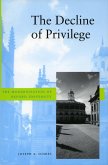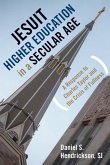Sommerville argues that a secular world view is propagated not just through American higher education, but public education, the media, and the courts despite their professed commitment to neutrality. The triumph of postmodern multiculturalism and the demise of Western Civilization courses, he says, have left students unable to make sense of the world in which they live. Moreover, the secular university, again despite professed neutrality, demonstrates the most condescending type of moralizing without nurturing ethical reflection. Sommerville considers how religiously-informed scholarship might enrich various academic disciplines. He examines the market forces that have created what he calls the post-secularist university but may also have opened the door for theologians to challenge the prevailing nihilism. Finally, he invites the reader to imagine a university where religion is not ruled out but rather welcomed at least as one legitimate voice among others. Sommerville's bracing and provocative argument is sure to provoke controversy and stimulate discussion both inside and outside the academy.
The American university has embraced a thorough secularism that makes it increasingly marginal in a society that is characterized by high levels of religious belief. The very secularization that was supposed to be a liberating influence has resulted in the university's failure to provide leadership in political, cultural, social, and even scientific arenas. In The Decline of the Secular University, C. John Sommerville explores several different ways in which the secular university fails in its mission through its trivialization of religion. He notes how little attention is being given to defining the human, so crucial in all aspects of professional education. He alerts us to problems associated with the prevailing secular distinction between "facts" and "values." He reviews how the elimination of religion hampers the university from understanding our post-Cold War world. Sommerville then shows how a greater awareness of the intellectual resources of religion might stimulate more forthright attention to important matters like our loss of a sense of history, how to problematize secularism, the issue of judging religions, the oddity of academic moralizing, and the strangeness of science at the frontiers. Finally, he invites the reader to imagine a university where religion is not ruled out but rather welcomed as a legitimate voice among others. Sommerville's bracing and provocative arguments are sure to provoke controversy and stimulate discussion both inside and outside the academy.
The American university has embraced a thorough secularism that makes it increasingly marginal in a society that is characterized by high levels of religious belief. The very secularization that was supposed to be a liberating influence has resulted in the university's failure to provide leadership in political, cultural, social, and even scientific arenas. In The Decline of the Secular University, C. John Sommerville explores several different ways in which the secular university fails in its mission through its trivialization of religion. He notes how little attention is being given to defining the human, so crucial in all aspects of professional education. He alerts us to problems associated with the prevailing secular distinction between "facts" and "values." He reviews how the elimination of religion hampers the university from understanding our post-Cold War world. Sommerville then shows how a greater awareness of the intellectual resources of religion might stimulate more forthright attention to important matters like our loss of a sense of history, how to problematize secularism, the issue of judging religions, the oddity of academic moralizing, and the strangeness of science at the frontiers. Finally, he invites the reader to imagine a university where religion is not ruled out but rather welcomed as a legitimate voice among others. Sommerville's bracing and provocative arguments are sure to provoke controversy and stimulate discussion both inside and outside the academy.








